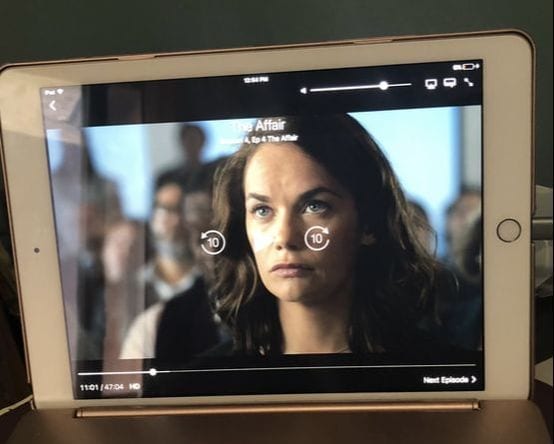I am a long-time fan of The Affair, Showtime’s riveting relationship drama created by Sarah Treem and Hagai Levi. I watched all three seasons to date and fell especially in love with the character Allison Bailey (played by Ruth Wilson). Her struggles with the death of a child, self-injury, suicidality, dissociation, and the impact of her developmental trauma on her relationship choices have been well-portrayed throughout the show. There were many times in the first three seasons where I cried along with Allison, at moments, literally feeling her pain. I would have placed The Affairon the top of my recommendations list prior to this Season 4 for rather competent representation of complex trauma and dissociation.
And then they introduced an EMDR storyline…
Aside from the obvious technical errors in the EMDR demonstration (i.e., using short eye movement sets where longer sets would be required; demanding the closing of eyes; mishandling of an abreaction; inaccurate description of mechanisms of action), the most problematic areas in the episode include:
- Having participants “scatter” to try the EMDR approach on their own without any practicum supervision; it is in this scenario where the character of Allison was extremely harmed by a fellow trainee (interested in Allison sexually) with rather nefarious intent
- Allowing participants to read from a worksheet, jumping directly from a poorly taken Client History (i.e., “What are your traumas?”), directly into reprocessing without any preparation or stabilization activities. Such activities would be imperative for any trainee or client, especially someone with Allison’s complex history
- Quite expectedly to anyone trained in EMDR therapy, this sloppiness led to Allison having a major abreaction that caused her to leave the training. In this rebound, Allison is shown drinking alcohol to finish telling her practicum partner the story, before he proceeded to take advantage of her sexually to “comfort” her
The show, which relies quite a bit on the “flash forward” technique seems to suggest that the relationship Allison develops with her colleague/fellow trainee who acted in this manner will cause her to experience a major mental health relapse.
Yes, my heart breaks for Allison, a character with whom I connect, as a fan of the show’s artistry. However, I must address the layers of my disappointment as a professional in reflecting upon this episode. I am disappointed in Sarah Treem, the writer of the episode who I’ve long regarded as brilliant, for either not getting adequate consultation in EMDR techniques or receiving the consultation and choosing to embellish them for effect. I am disappointed and upset by the inaccurate portrayal of EMDR therapy in the episode, especially when those of us who practice and train EMDR therapy are constantly in a position of needing to defend its efficacy and responsibility against the widespread myths and misinformation that abounds. Lastly, I am disappointed that the show, which has always had great potential to shed a light on issues related to trauma, addition, alcoholism, grief, loss, and dissociation missed an amazing opportunity. The creators could have chosen to showcase trauma healing modalities in a more accurate light that could serve, and not just, entertain, the public.
The season is not over so I will continue to watch and notice if the writing redeems itself on this issue. In the meantime, if you are seeking to learn what EMDR is really about, please consider visiting these complimentary resources produced by The Institute for Creative Mindfulness:
Teleseminar recording on EMDR therapy by Dr. Jamie Marich: http://www.thebreathenetwork.org/emdr-therapy-and-the-healing-of-trauma-teleseminar
Overview interview on EMDR therapy with Dr. Jamie Marich: http://www.thebreathenetwork.org/integrated-trauma-healing-with-emdr-therapywww.thebreathenetwork.org/integrated-trauma-healing-with-emdr-therapy
Full Phases 1-8 Demonstration of EMDR therapy by Dr. Jamie Marich: https://www.youtube.com/watch?v=L6UvKhLYf7w&feature=youtu.be
Interview with Dr. Jamie Marich & Dr. Stephen Dansiger (ICM Senior Faculty Members) on EMDR therapy and their latest book, EMDR Therapy & Mindfulness for Trauma-Focused Care:
https://www.thetraumatherapistproject.com/podcast/trauma-emdr-mindfulness-jamie-marich-stephen-dansiger/















One Response
Hello
I think your review is quite accurate that this portion of the show was dramatized for optics. The character of Allison should never had been asked to partner with someone to go into a checklist regarding traumas and especially EMDR. I have been through EMDR before and am a graduate student in counseling and I think it’s usefulness to my life has been immense. It’s a shame they portrayed it in this light and then had Allison’s character be taken advantage of. I agree also that the show had such an opportunity to shed a light on grief, developmental identities and trauma